
Toward
the end of the 19th century, the
practice of making trade cards
and paper handouts featuring the American flag
overprinted with advertising.
Advertisements often with one or more candidates of
an impending political election or
specific products and events
became popular among businesses
across America. At the height
of the practice, circa 1880-1890,
trade cards featuring the a
presidential portrait or candidate
in the canton could be ordered in
bulk quantity with custom overprints
for a particular business or event.
The most prevalent of these were
made for the 1880 election between
James A. Garfield and Winfield Scott
Hancock, printed by Carter, Rice &
Co. of Boston. Collectively, they
form a charming and unusual focus
area for flag collectors.
These rare
cards and printed advertisements are increasingly
difficult to find. Many of
them may well be unique, the last
surviving example of their kind. They interesting because of their folky
design. Their brief sales pitches,
sometimes printed in a variety of
font types and sizes, are curious
and fun to read. Ironically,
the flag serves as a perfect medium for
advertising. After
all, who would want to throw away an
American flag? Often, the
writing on a card allows us to
determine the precise location where
a card originated, providing a fun
geographic exercise as well. I will continue to
add more cards to this page as they are
found and added to the Rare Flags collection
over time.
|
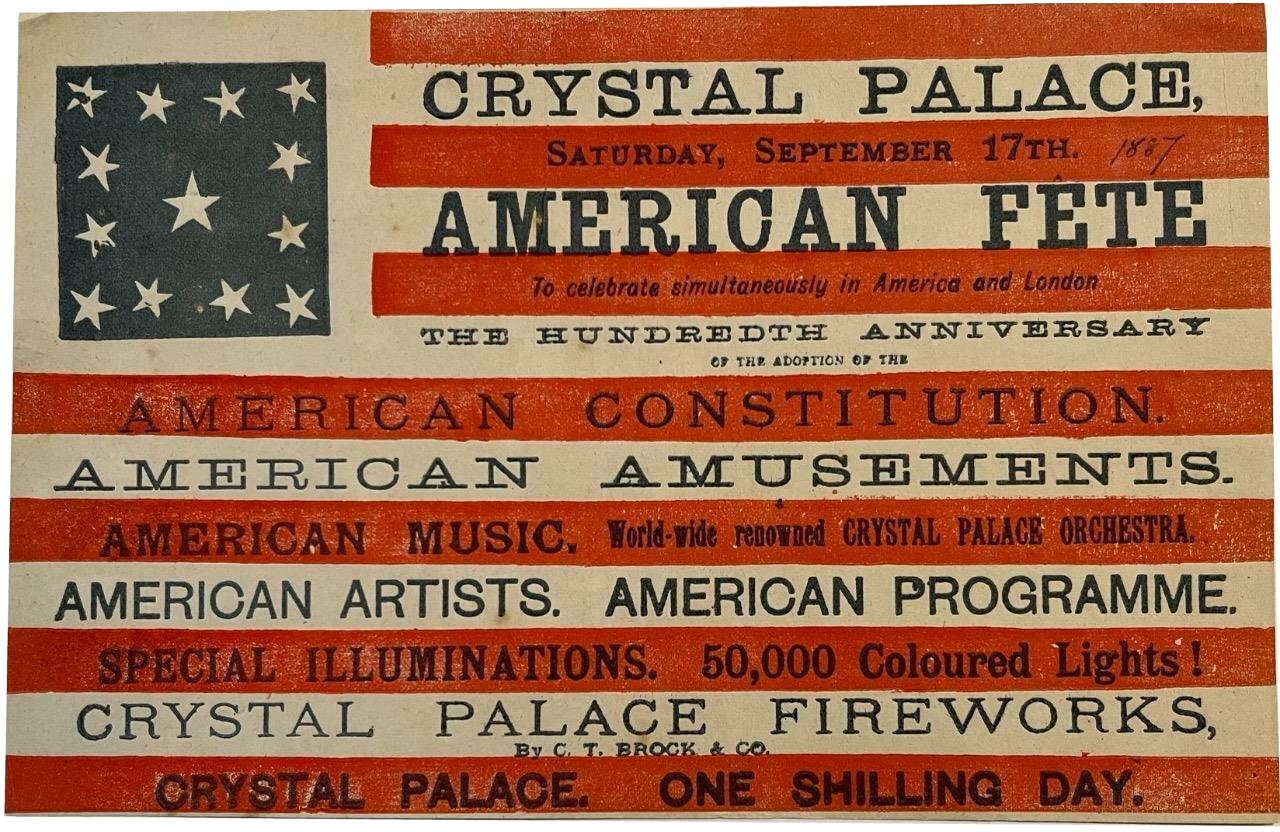 |
Crystal Palace American Fete,
1887
Printed in London in 1887,
this fantastic example of
flag overprint advertising
invited Londoners to attend
a celebration of the 100th
anniversary of the American
Constitution. It is a rare
masterpiece example of 19th
century overprinted flag
advertising. |
|
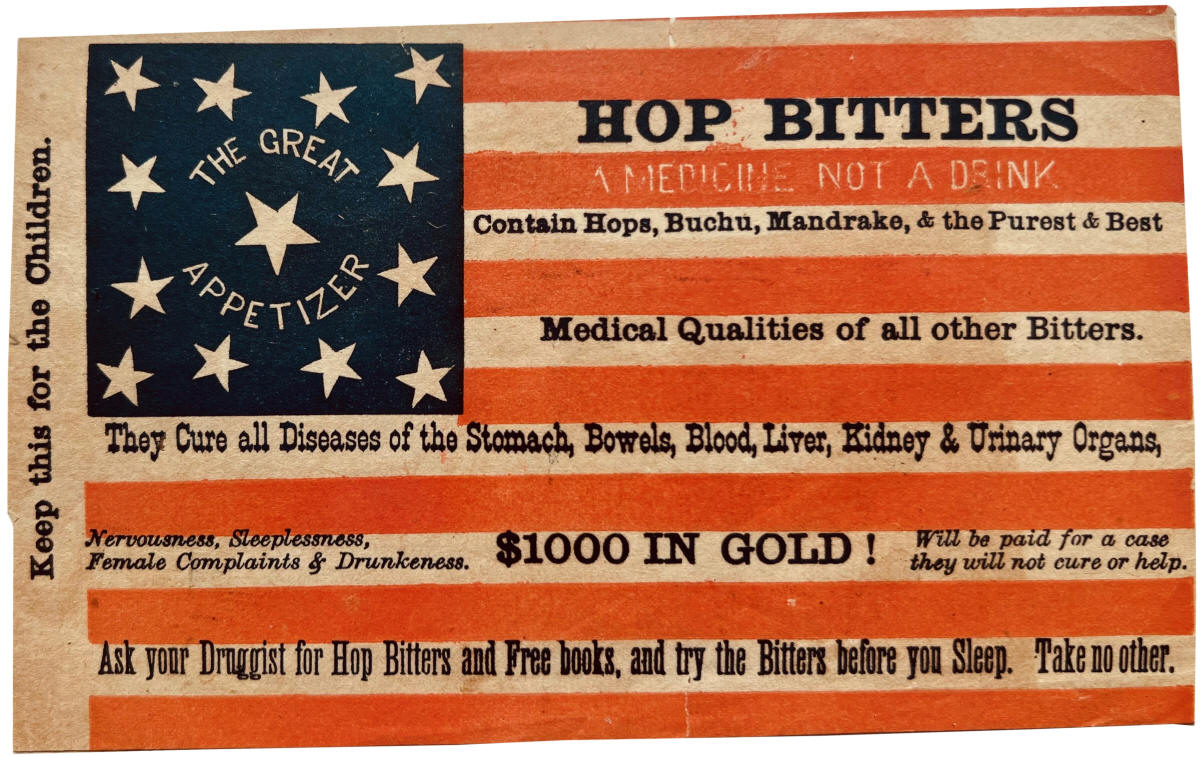 |
Hop Bitters,
Circa 1880
These small paper flags were included along with sales of bottles of Hop Bitters, a medicinal concoction touted to be an effective remedy for a range of maladies and discomforts. Containing alcohol and botanicals, Bitters have been used since ancient times. The fantastic overprinted text on this flag is indicative of the advertising styles of the late 19th century, featuring a large variety of fonts, text sizes and styles.
|
|
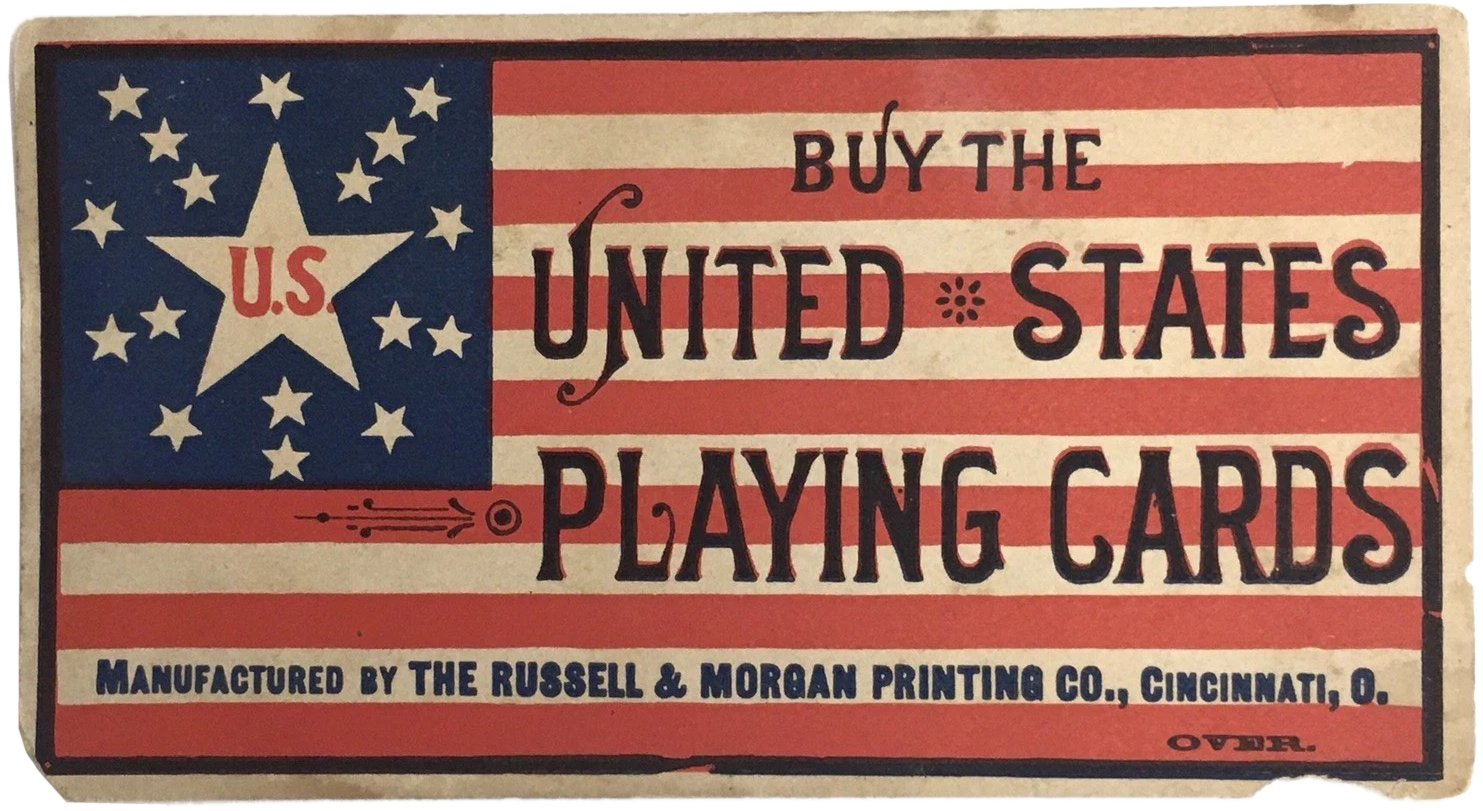 |
United States Playing
Cards,
c1885
Cincinnati, Ohio
A fantastic advertisement
for playing cards
manufactured by the Russell
& Morgan Printing Company.
The Great Star pattern with
radiant starburst and
attractively styled fonts
make this a prime example of
advertising using the
American Flag motif in the
late 19th century.
|
|
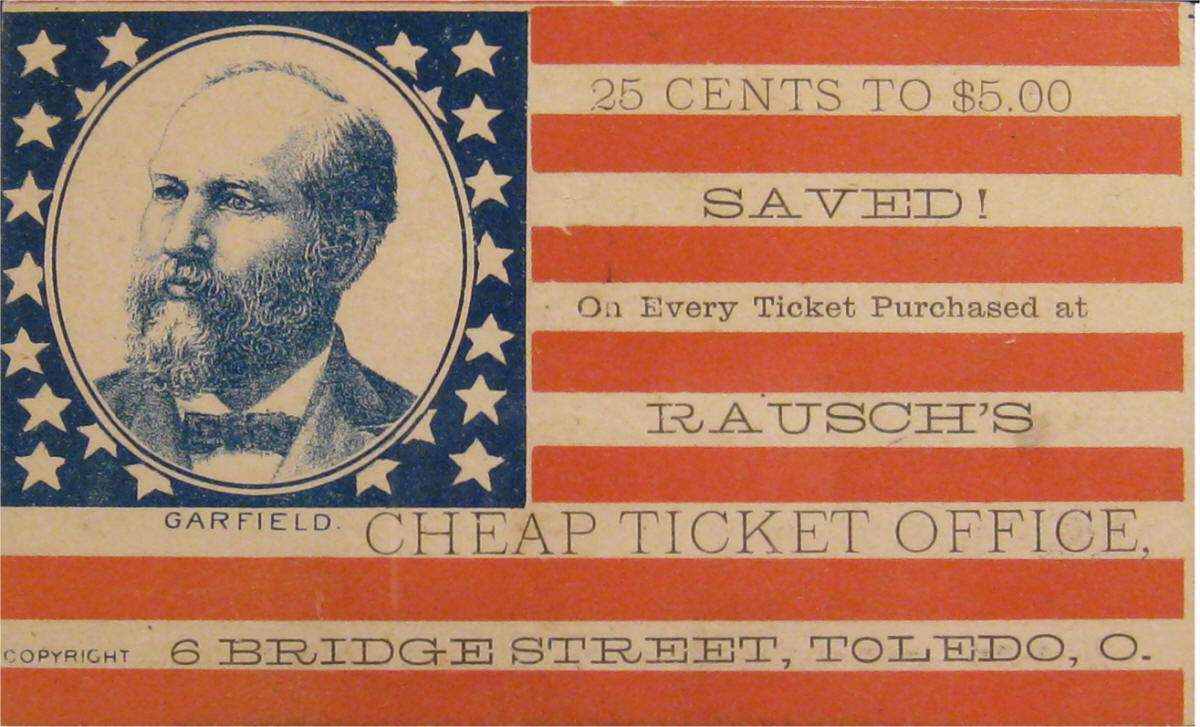 |
Rausch's Cheap Ticket
Office, c1880
Toledo, Ohio
Rausch
offered discount tickets to
Americans traveling west to
the Northwest Territories
during the 1880's.
Curiously, a search for
Bridge Street in Toledo
returns no results, though
there is a Bridge Street located
just outside of Toledo in
the suburb neighborhood of
Grand Rapids.
|
|
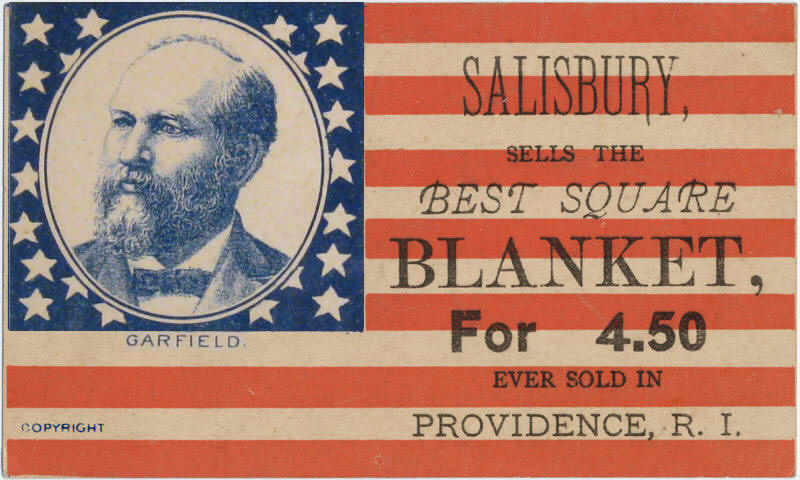 |
Salisbury Square Blanket,
c1880
Providence, Rhode Island
Salisbury's,
selling the best square
blanket ever sold in
Providence!
Salisbury's, was located at
45 Dorrance Street,
Providence, Rhode Island.
A
companion Hancock card
from Salisbury's, with the
same overprint, is in the
collection of the
Smithsonian Museum of
American History and is
featured on the Star
Spangled Banner Project
website as a demonstration
of the type.
 Click
here to visit 15 Dorrance
Street, Providence, Rhode
Island on Google Maps Click
here to visit 15 Dorrance
Street, Providence, Rhode
Island on Google Maps |
|
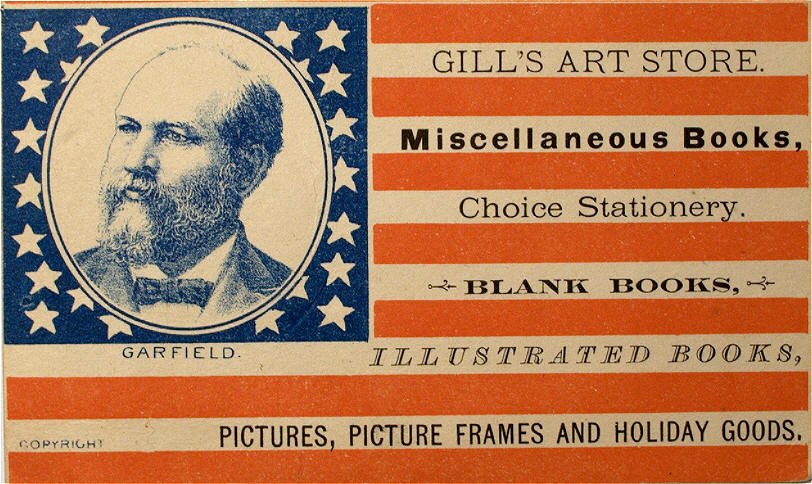 |
Gill's Art Store, c1880
Springfield,
Massachusetts
J.D. Gill's Art Store and
Art Gallery was located in
Springfield, Massachusetts.
J.D. Gill grew his business
from one of books and
stationary to also include
fine art. Although
I've been unable to
determine the exact address
in Springfield of the store's location, a photo of
Gill's Art Store is pictured
here.
store's location, a photo of
Gill's Art Store is pictured
here.
|
|
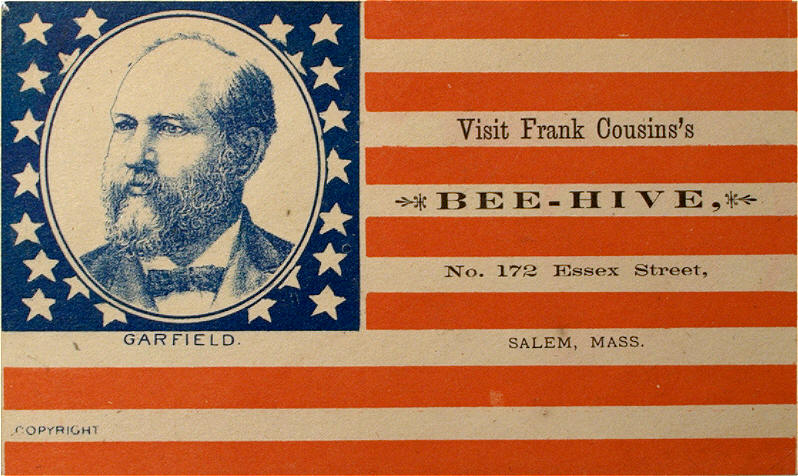 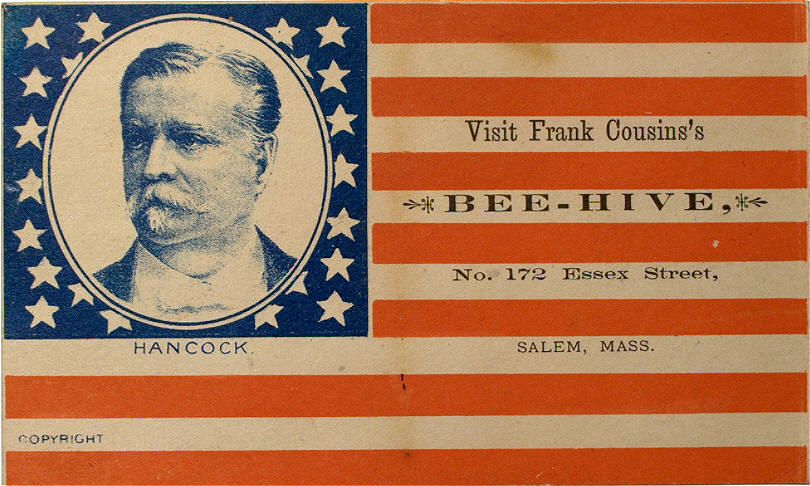 |
Frank Cousins's Bee-Hive,
c1880
Salem, Massachusetts
This rare pare of
matched trade cards is from
Frank Cousins's Bee-Hive, a
general store located at 172
Essex Street, Salem,
Massachusetts. While
single trade cards are rare
themselves, this is the only
pair of matching trade cards
of the style that I've ever
encountered. Pictured
here is Frank's Bee-Hive
located at the corner of
Essex Street and St. Peter
Street in Salem. Essex
and St. Peters no longer
intersect, the current
location being near the
current day Peabody Essex
Museum.
 Click
here to visit 172 Essex
Street, Salem,
Massachusetts, on Google
Maps Click
here to visit 172 Essex
Street, Salem,
Massachusetts, on Google
Maps |
|
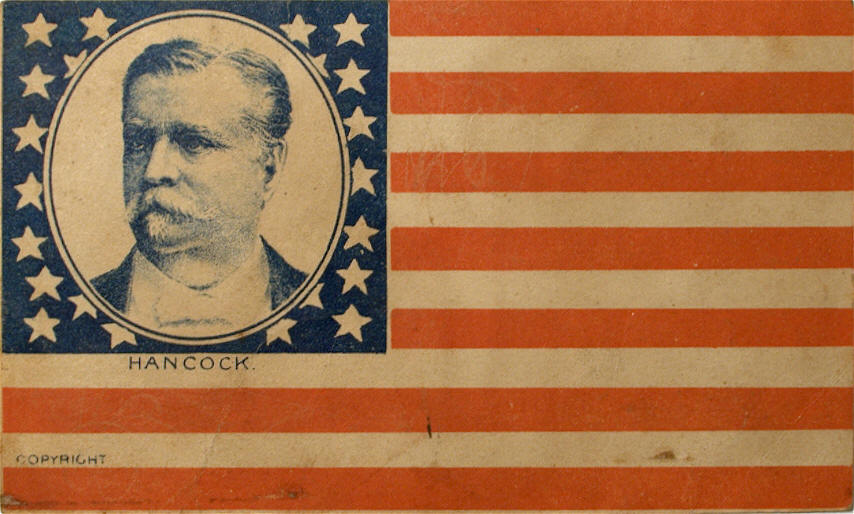 |
Will Lamson's John Street
Store, c1880
Lowell, Massachusetts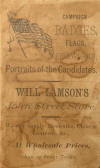
Will Lamson apparently chose
to only print his
advertisement on the reverse
of his cards. His
offerings are appropriately
patriotic, selling
celebratory campaign badges,
candidate portraits, and
fireworks.
Click here to visit 52
Merrimack Street, Lowell,
Massachusetts, at the corner
of Merrimack and John
Street, on Google Maps
|
|
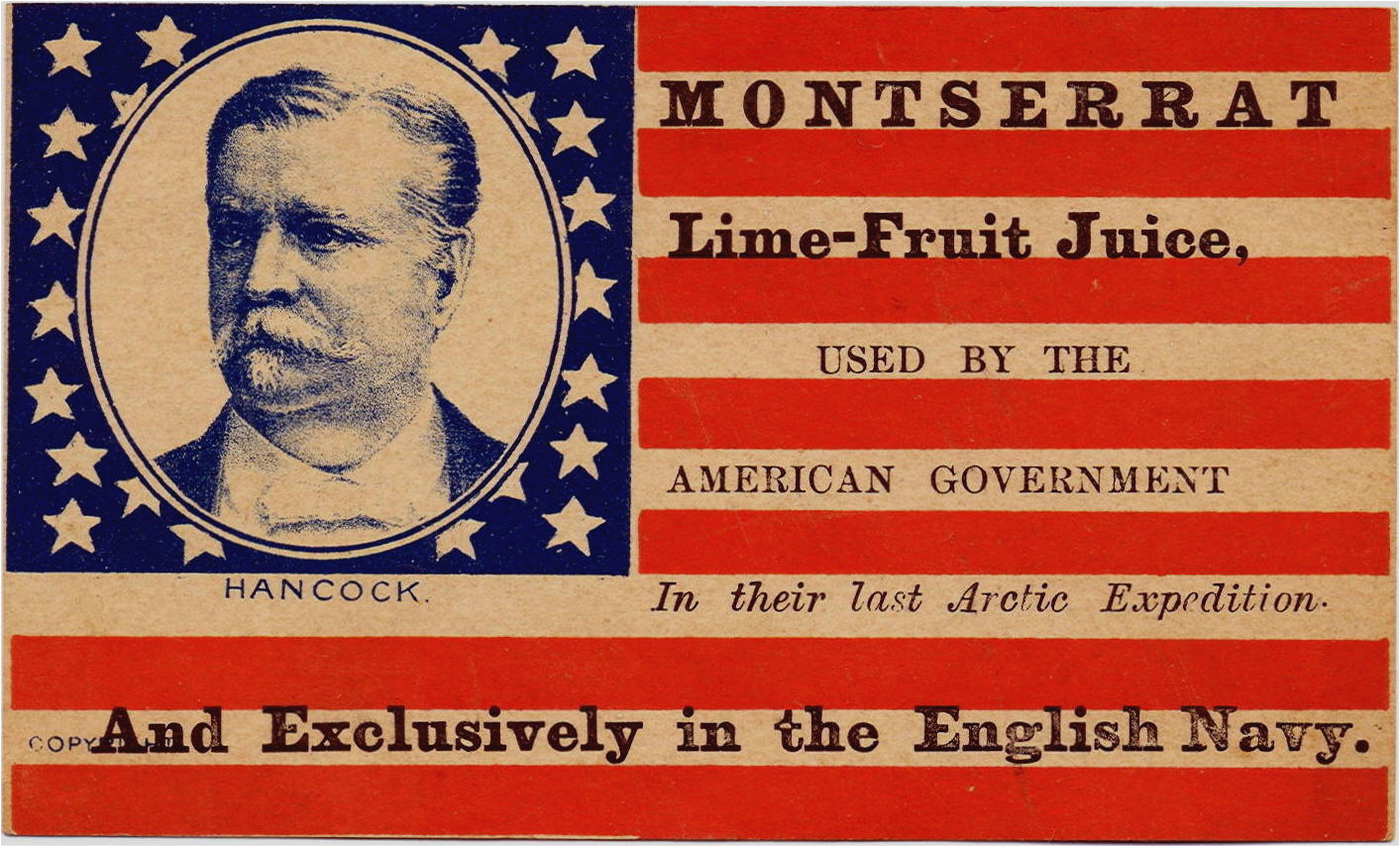 |
Montserrat Lime-Fruit
Juice, c1880
Montserrat Company Ltd.,
Montserrat, Caribbean
Established by Joseph E.
Sturge in 1869, Montserrat
Company Ltd. was formed on
the island of Montserrat to
produce and export lime
juice for use in the
manufacture of citric acid.
In the 1860's the British
Government began replacing
Mediterranean lemon juice
with West Indian lime juice
to combat scurvy aboard its
vessels. Only later was it
discovered that the lime
juice was much less
effective than lemon juice.1
The card's date circa 1880
makes it likely that it
refers to the arctic
expedition of the ill-fated
USS Jeannette, which
departed for the arctic in
July, 1879, became trapped
in arctic ice, and was
crushed and sunk in June
1881. References
describe rations of lime
juice being given to the
crew of the Jeannette
to ward of scurvy.2 |
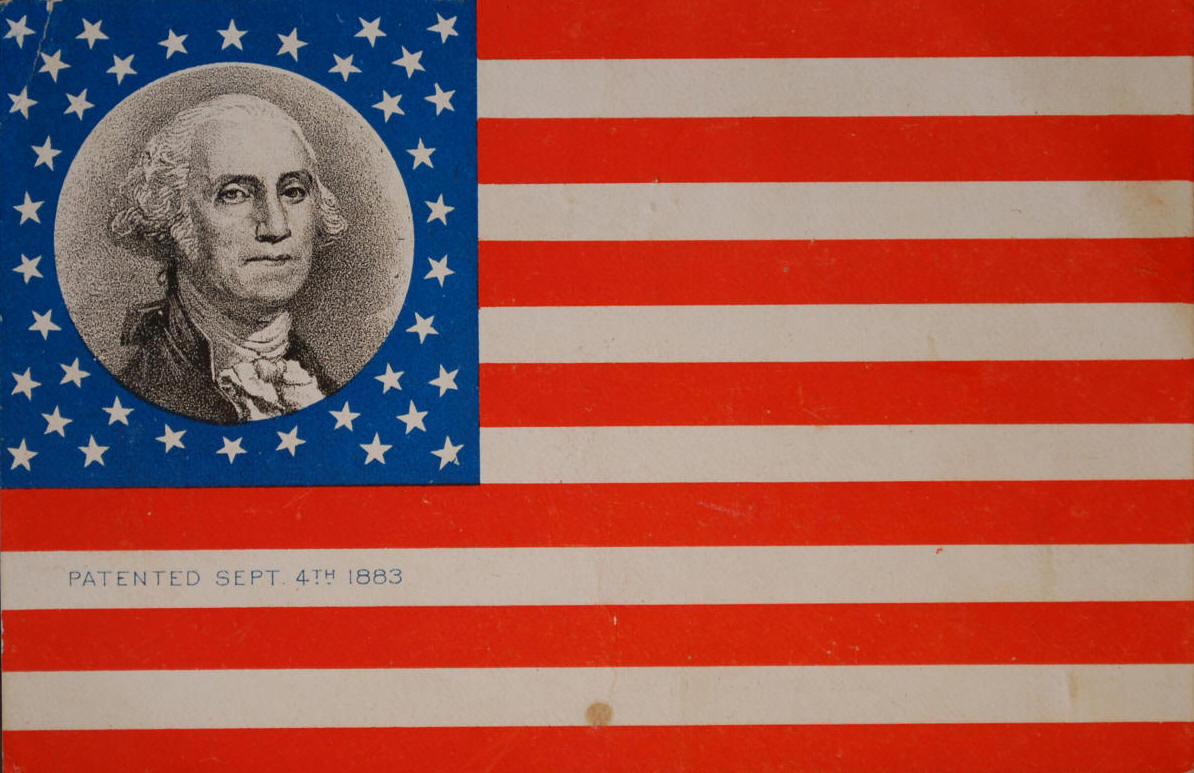 |
Patented Campaign Banner,
1883
This very rare
card has a patent date of
September 4, 1883. The
card is a salesman's sample,
with the reverse urging to
place orders of these cards
with your favorite
candidate's portraits in the
canton. This card,
clearly a demonstration
card, shows George
Washington's portrait in the
canton surrounded by a full
complement of 38 stars. |
|
|
|
|

